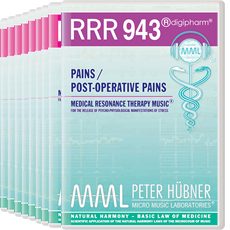| digipharm® |
| Home • Site Map • Research • Reports • International Experts • Music Preparations • Fundamentals • News • Questions • Shop |
| digipharm® |
| peter huebner • micro music laboratories |
| M E D I C A L R E S O N A N C E T H E R A P Y M U S I C® |
| R E D U C T I O N O F P S Y C H O – P H Y S I O L O G I C A L M A N I F E S T A T I O N S O F S T R E S S |
Scientific Studies and Clinical Observations – Summary
Surgery
- Normalization of sleep following surgery in 70%, compared to 57% in the medication group.
- Dispersion of mental manifestations of stress: normalization of the mental functions after gynecological surgery: there was complete normalization of 77.8% of the factors of the mental profile.
In 11.1% of the factors there was a significant improvement and 11.1% of factors became worse.
The levels for the control group: there was complete normalization of 10% of the factors, 10% showed significant improvement and 20% became worse. 10% of the factors became predominantly worse, 10% remained unchanged and 40% displayed vague effects.
The common average profile after treatment with MRT-Music® showed a complete normalization of the mental functions. In respect to mood, 69% of the reports showed a significant improvement in mood and reported a feeling of an internal uplifting of the spirits. - Improvement in the mental state in mentally over-burdened women before, during and after gynecological surgery: in 22.2% a complete normalization and in 44.4% a significant improvement of the mental functions. None of the control group experienced complete normalisation, 23% experienced a significant improvement.
- Lowering of the blood pressure in women before and after gynecological surgery: 31% of the women with hypertonia experienced a fall in blood pressure of 15-25 mmHg.
- Relief of pain during minor surgery – 57% experienced the surgery as painless, as opposed to only 8% in the control group.
- Normalisation of mental functions after uterine fibromyom surgery: By the treatment with the Medical Resonance Therapy Music® within the context of the complex therapy great changes in the mental profile took place – in 77,8% of the factors a complete normalization established – in 11,1% of the factors a significant improvement became evident – in 11,1% of the factors a deterioration occurred. The common average profile after the treatment with the Medical Resonance Therapy Music® did not surpass 50-55 t-points, indicating a complete normalization of the mental functions in this group on average.
- Reduction of the stress hormone cortisol after gynaecological surgery: At the end of the postoperative treatment, which means at the 10th-12th day, the cortisol content in blood was reduced by factor 2,4 (60%), in the control group this factor was 1,7 (41%) compared to the initial level.
- Reduction of analgesics following gynecological surgery – in 78.6%, prolonged effectiveness of the anesthetizing and pain-killing medicine was evident, and this led to a significant reduction in quantities prescribed.
- Improved mental state in women after vacuum aspiration: After the treatment complete normalization of the mental functions was re-established again in 22,2% of the women, in 44,4% a clear improvement could be documented, no change took place in 11,1% and 22,3% of the women experienced a certain degeneration.
- Healing-inducing effects in blood formation following gynecological surgery: at the end of the treatment only 26% of the results indicated anemia, compared to 39% in the control group.
- Dispersion of headaches following surgery – after treatment 62% of the reports documented complete eradication of the headaches.
 |
For this indication please use the program:
PAINS / POST-OPERATIVE PAINS |
||
| If you want to look at the studies in detail, please visit:
SCIENTIFIC STUDIES & CLINICAL OBSERVATIONS – COMPLETE STUDIES |
|||
With kind permission of AAR EDITION INTERNATIONAL
© 1998- DIGIPHARM >
© 1998- DIGIPHARM >